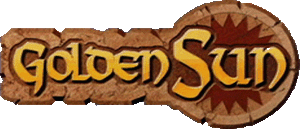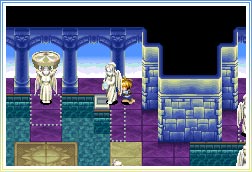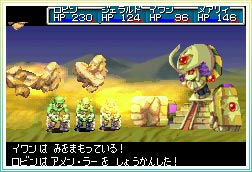|
|

|
BATTLE SYSTEM
|

|
INTERACTION
|

|
ORIGINALITY
|

|
STORY
|

|
MUSIC & SOUND
|

|
VISUALS
|

|
CHALLENGE
|
Easy |
COMPLETION TIME
|
20 to 30 hours
|
|
OVERALL
2.5/5
|
Rating definitions
|
|
|
On the surface, Golden Sun is the tale of a young band of heroes out
to save the world by preventing the planet's lighthouses from being
lit. Apparently lighting lighthouses leads to the luminosity of
annihilation.
In reality, Golden Sun is designed to show players the dangers of continued
video game usage: everyone on the continent suffers from a bizarre
form of epilepsy that manifests itself by drastic seizures in even
the most normal of conversations. Yet no one seems concerned by
this epidemic; all focus is on young Isaac as he continues to be
one step behind the villains.
The story begins as a youthful pair of soon-to-be heroes witness a drastic and life-altering calamity in their home village. Mysterious bad guys, boulders crashing, people being swept downstream - it is the whole nine yards of classic disaster in RPG land. Some years later, the children have grown up into full-fledged adolescents, complete with requisite unique magic powers. The bad guys show up again, wreck havoc, and the heroes are forced to chase them all over the continent.
 Just another day of moving
heavy goddess statues around.
Just another day of moving
heavy goddess statues around. |
|
When the heroes finally catch up to the evil doers, the story ends. No, wait.
The story does not end; there is no actual conclusion to the story.
It ends mid-point. If you care about what happens to Isaac et al,
then be prepared to buy Golden Sun: The Lost Ages which is
a continuation, not a sequel.
Camelot clearly intended to produce an old-school feel with Golden
Sun, and they succeeded in imitation but fell far short of distinctiveness.
In many respects, Golden Sun hearkens back to SNES era RPGs:
the musical and visual style ought to remind gamers of classics
such as Chrono Trigger or Final Fantasy VI. But Golden
Sun lacks the originality and panache that such classic RPGs
exhibited; its unimaginativeness is its downfall.
Battles are random, and the battle system is in the style of the most basic
turn-based RPGs with few commands beyond the obvious: attack, magic,
item, etc. Veterans will find few surprises save for the Djinni
summon/standby/set. Players should note that Golden Sun is
truly old-school in that characters will not automatically switch
targets should someone else kill their target first; they will simply
defend rather than do anything else.
One of the few semi-original ideas of the game is its usage of psynergy, ie magic. Players will come across elemental Djinni during their travels and can equip Djinni on each character. This, in turn, will bestow psynergy (spells) and change the character's class, which will affect character attributes. Swapping different elemental types will result in different character classes, each class having diverse spells and attributes.
While being able to change classes on the fly is an interesting experience, it can become problematic if a certain spell is needed to solve one of the many puzzles but is not a part of your normal class lineup. Finding the spell will require remembering which combination of Djinni on which character bestows that spell.
Djinni also play an important part in battle. Not only do they grant raised attributes, they can also be used for various effects: healing, attacking, etc. Once they are used, they are no longer set to that character. This enables two things: first, any attributes given by the Djinn are reduced immediately, and second, the Djinni can be summoned by any character for a devastating attack. Once summoned, they wait a few turns and are then set again to their original character, thus making a cycle.
If that sounds vaguely chaotic, it is. Most players will probably not want to mess with the whole thing and stick with basic attacks and magic; enemies tend to fall easily even without Djinni involvement. Of course, some may realize that summoning four combined elementals at once results in near insta-death to normal enemies, so they may want to continually exploit that.
Puzzles play a large role in Golden Sun. Unfortunately, these puzzles
tend to use the same tricks over and over again. Most are quite
obvious and some simply require experimentation to solve. This is
a gameplay aspect that could have introduced much needed innovation,
but by the end turns into mere drudgery.
Golden Sun's difficulty level is aimed at a younger audience; there
is not much that cannot be killed on the first try. Even bosses
seem unusually easy as they rarely pose a threat to prepared players.
 I give you... PAIN!!!!
I give you... PAIN!!!! |
|
Conversation and moving the story forward are sometimes frustrating. It is
not uncommon for players to be locked into conversation sequences
that require five to ten minutes, most of which is taken up by the
vast deluge of emoticons and body convulsions from which the characters
suffer. Gamers looking to play Golden Sun portably should
be wary of getting stuck in the middle of a conversation and being
unable to save.
Furthermore, the main character's involvement is a joke. Oftentimes the player
is presented with a yes/no choice within a conversation. It does
not matter the least which is chosen: Golden Sun is like
a dungeon master who knows which way he wants the story to go and
brooks no interference. Eventually it becomes amusing to pick the
"wrong" answer and see how badly the writers had to bend over in
order to keep the storyline going in the same direction.
The map is almost useless, and players should expect to spend a good bit of time criss-crossing the land from place to place: no airship/warp spells here.
Visually, Golden Sun does shine. The backdrops and animations
are top-notch, especially for an early Game Boy Advance game. The
music is also quite pleasing, easily above average even for the
small speakers of a GBA.
Overall replayability is low: there are few sidequests and the story is only half complete. Of course, the game shuts down after the final boss is beaten; do not expect to be able to wander freely after everything ends.
Golden Sun is a tough recommendation: it is too bland to be held in
high regard, but it is not necessarily bad. It is worth a single
play-through but not much more.
Review Archives
|









